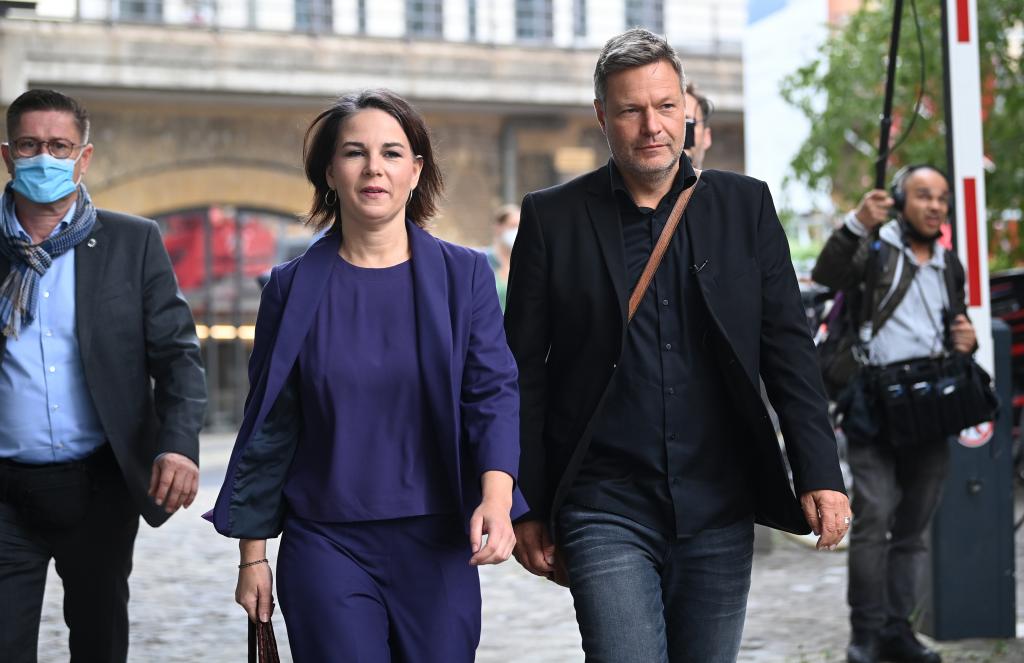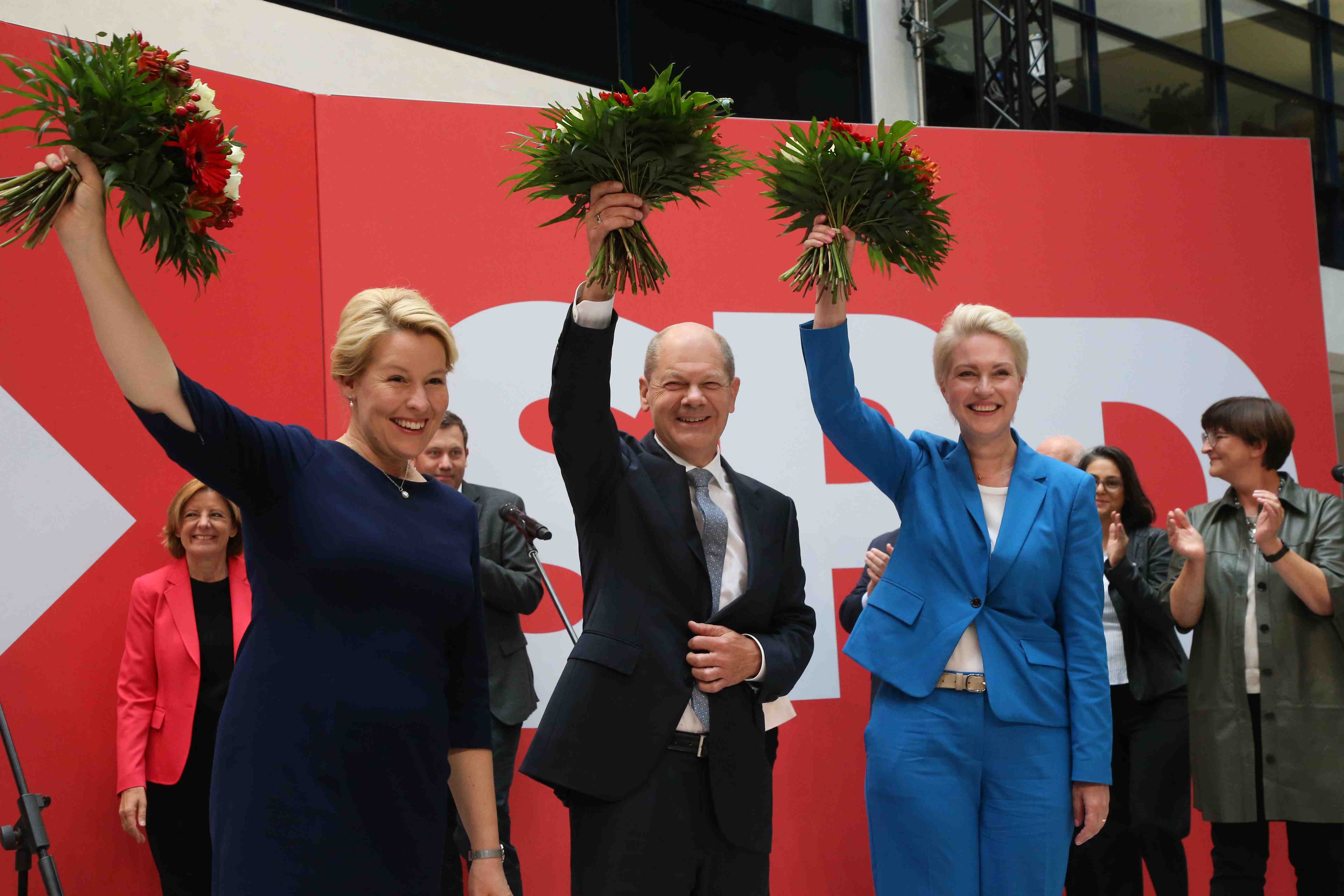Thessaloniki gets ready for its metro launch in November
The underground rapid transit lines have been under construction for almost two decades due to various project delays
 TheMayor.EU logo
TheMayor.EU logo 
Robert Habeck (R) and Annalena Baerbock (C), federal leaders of the Alliance 90/The Greens, Source: Britta Pedersen/dpa
The elections in both Berlin and Germany yielded a relatively even split between several parties, making three-way coalitions unavoidable
According to the final preliminary results, the SPD (Social Democratic Party of Germany) have won the lion’s share of the vote in the Bundestag election on Sunday. At the same time, Angela Merkel’s conservative Christian Democrats (CDU/CSU) suffered their worst result since 1949 after being in power for 16 years.
Though the election forecast seemed quite close at the end of last week, around 16% of voters were still undecided. In the end, the race was very much between the three top candidates, Olaf Scholz, Annalena Baerbock and Armin Laschet.
At the same time, the SPD managed to squeeze out a victory in Berlin’s municipal elections as well. Here, the CDU/CSU fell to third place, while the Greens came out as a close second.
Berlin’s election included an additional key issue, a referendum on expropriating large corporate landowners' property. The referendum passed and the city’s next ruling coalition will have to tackle the practical implementation of the voters' choices.
The CDU/CSU managed to win around 24.1% of the vote in the national election which translates to 196 seats in the Bundestag, putting them in second place, behind the SPD. The third biggest party are the Greens with 14,8% and 118 seats.
While the SPD won the largest share of the popular vote (25.7%; 206 seats) they still need to form a three-way coalition to reach a majority and have a successful bid for the Chancellery.
Currently, Olaf Scholz, the SPD candidate and ex-Minister of Finance, has reaffirmed the party’s position that they will try to form a red-green-yellow (SPD, Greens, FDP) alliance with the fourth largest party in the Bundestag – the FDP (Free Democratic Party), which is sitting at 11.5% and 92 seats.
The far-right AfD (Alternative for Germany) came in fifth with 10.3% and 83 seats, however, both the CDU/CSU and the SPD have refused to work with them. The sixth party is Die Linke (The Left) with 4.9% and 39 seats. It looks unlikely that they will take part in the governing coalition, as an SPD, Greens, Die Linke alliance does not form a majority.
Regardless of what the final governing coalition looks like, the relatively even split vote shows a different Germany, taking a more pluralistic approach to parliament. Whether this is a sign of instability or of a diverse society capable of compromise towards a common goal, only time will tell.
The elections in Berlin tell a similar story on a regional level, as the SPD managed to secure the largest share of the vote at 21,4%. Their candidate Franziska Giffey, a former Federal Minister for Family, Seniors, Women and Youth will probably be the next Mayor of Berlin.
 (L-R): Franziska Giffey (SPD), Olaf Scholz, Chancellor candidate (SPD),
(L-R): Franziska Giffey (SPD), Olaf Scholz, Chancellor candidate (SPD),
Manuela Schwesig, Minister-President of Mecklenburg-Vorpommer,
Source: Wolfgang Kumm/dpa
The second-largest party are the Greens (18,9%), followed by the CDU/CSU at 18,1%. Die Linke managed to secure 14,0% of the vote, while AfD and the FDP came in at 8,0% and 7,2% respectively.
Regardless of the final results, Berlin’s local government will have to be a large coalition capable of compromises on the contentious issues facing the city now and in the next five years, issues like housing, climate change, biodiversity and sustainable energy production.

The underground rapid transit lines have been under construction for almost two decades due to various project delays

Now you can get your wine in Talence by paying directly in Bitcoin

That’s because the state has to spend money on updating the railway infrastructure rather than subsidizing the cost of the popular pass

Rethinking renewable energy sources for the urban landscape

The examples, compiled by Beyond Fossil Fuels, can inform and inspire communities and entrepreneurs that still feel trepidation at the prospect of energy transition

Now you can get your wine in Talence by paying directly in Bitcoin

The 10th European Conference on Sustainable Cities and Towns (ESCT) sets the stage for stronger cooperation between the EU, national and local level to fast track Europe's transition to climate neutrality.

At least, that’s the promise made by the mayor of Paris, Anne Hidalgo

The underground rapid transit lines have been under construction for almost two decades due to various project delays

At least, that’s the promise made by the mayor of Paris, Anne Hidalgo

Hostal de Pinós is located in the geographical centre of the autonomous region

Despite its church-y name, the district has long been known as the hangout spot for the artsy crowds

Urban dwellers across the EU are having a say in making their surroundings friendlier to people and the environment.

Forests in the EU can help green the European construction industry and bolster a continent-wide push for architectural improvements.

Apply by 10 November and do your part for the transformation of European public spaces

An interview with the Mayor of a Polish city that seeks to reinvent itself

An interview with the newly elected ICLEI President and Mayor of Malmö

A conversation with the Mayor of Lisbon about the spirit and dimensions of innovation present in the Portuguese capital














